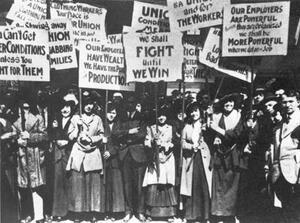A Day Without A Woman Isn't Just For the Privileged
There was a particularly puzzling perspective floating around the Internet leading up to today’s A Day Without a Woman. It showed up as a question on our social media sites; in a widely shared article in the LA Times; and in another widely shared article in Quartz. This perspective posits that A Day Without a Woman is nothing but a strike for the kind of privileged women who can afford to skip work consequence-free. One imagines a blonde woman of Anglo descent taking an iPhone selfie with a designer protest sign while the poor, poor women of other socioeconomic classes toil away at jobs that they lack the resources to escape.
But if you know anything about labor history, this image makes little to no sense. Ever since the Industrial Revolution, strikes have been an essential tool of the working class in its struggle for humane working conditions. Our archives are replete with these stories, from the 1907 New York City rent strike organized by sixteen-year-old Pauline Newman to the Uprising of the 20,000, which was a massive eleven-week strike in 1909 by shirtwaist factory workers against workplace indignities suffered exclusively by women. The people who fought for these labor rights were by and large not people of wealth and privilege; after all, most privileged women didn’t even work until the 1960s. These labor activists were workers who put their lives, jobs, and bodily autonomy on the line to advocate for the protections that all workers enjoy today.
Of course, working-class women have been striking all year; February alone saw the Day Without Immigrants and the Yemeni New York City bodega strike against Trump’s Muslim Ban in February. This particular strike seems to be drawing so much ire because of its breadth, and because upper middle-class women fall under its umbrella. But guess what else has been super effective throughout history? Middle- and upper-class people using their cultural leverage and flexible schedules to aid in workers’ causes. When Pauline Newman was organizing her strike, she asked housewives to go door-to-door to encourage their neighbors to help with the strike during the day, while Newman and her fellow working girls were at the factory. Should we dismiss Newman's strike, and the social reform it sparked, as the purview of the privileged simply because it was easier for those housewives to participate than it was for the working girls?
Another criticism that I’ve seen leveled against A Day Without a Women is that the strike is too broad and that it lacks a clearly defined set of goals. This criticism also misses a large aspect of the history of strikes and activism. Historically, strikes have not been solely about issuing a specific demand, accomplishing said demand, and going home. Of course, many strikes throughout history have led to concrete victories, but perhaps most importantly, all strikes bring visibility to issues and new ideas. Newman’s strike succeeded in reducing rents for 2,000 families, but it was perhaps most notable for bringing the concept of rent control into the national conversation. While the strike did result in lowered rents, the far-reaching effect of the strike–– rent control––wasn’t actually implemented until the 1930s.
The stated purpose of A Day Without a Women is to bring attention to the indispensable role women play in the American and global economies; the unpaid labor they perform; and the gender discrimination and lack of workplace support they face. Of course, it’s unlikely that today’s strike will lead to an immediate fix for these issues. Trump isn't going to go home tonight and reverse the global gag rule or suddenly sign protections for working parents into law. But it is likely that today’s strike will flood social media with pictures and statements, that it will appear in headlines and think pieces, and that it will bring these ideas about women's role in the economy and unfairly gendered labor practices into the national conversation.
Circling back to the accusations of privilege: it's especially odd that naysayers are painting this strike as the purview of the privileged when working-class women and women of color have the most to gain from the strike's success, as they are disproportionately affected by the very issues that today's strikers are protesting against. That being said, I hope it's obvious that no woman should ever guilt another, less privileged woman into striking. We must acknowledge that not everyone wants to or is able to participate in these events, for a panoply of reasons. Engaging in activism is, indeed, easier when you are an activist with privilege. But guess what else is easier with privilege? Literally everything. We shouldn't use our awareness of privilege as an excuse to not show up, nor should we discount the power of the strike simply because strikes are more accessible for the wealthy. To do so diminishes the history of the labor movement and ignores the fact that privileged women have immense cultural leverage that they can and should use to advocate on behalf of the less privileged. It’s also just plain condescending to imply that economically disadvantaged women lack the resources and determination to advocate for themselves.
If you oppose the strike because you think it’s an event for the privileged, I encourage you to read up on your history. This isn’t the working class’ first time around the block.








I feel this is one of the such a lot important information for me.
And i am happy reading your article. However want to observation on few normal things,
The web site style is perfect, the articles is in reality excellent :
D. Good activity, cheers
Feel free to vissit my site youtu.be